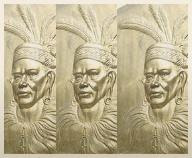SARAWAK'S Dayaks seldom feature with any significance in the national imagination of Malaysia, and certainly do not make headlines in the national media. This reflects the political marginalisation of the Dayaks in their home state.
The Dayaks collectively make up nearly half the state's population, and by the logic of communal politics, they should dominate politics in Sarawak. They did, briefly, during the early years of Merdeka, when their political vehicle was the Sarawak National Party, or SNAP. The president of the party then, Datuk Stephen Kalong Ningkan — an Iban — was the first chief minister of Sarawak, serving from July 1963 to September 1966. He was removed from office by a federally initiated Declaration of Emergency and a constitutional amendment resulting from a protracted constitutional crisis. Since 1970, the office of the chief minister has been held by two Melanau Muslims.
The dream of Dayak leaders since has been the restoration of what they consider their political glory: the installation of a Dayak chief minister. Formed in 1983 as a splinter group from SNAP, the Parti Bangsa Dayak Sarawak (PBDS) was the vehicle for this mission. The PBDS applied and was accepted as a member of the Barisan Nasional (BN) coalition.
In the Ming Court affair of 1987, the PBDS left the BN and joined forces with Persatuan Rakyat Malaysia Sarawak (Permas) to form the opposition Maju alliance. They mounted a credible challenge to the BN in the subsequent state elections, but failed to dislodge Chief Minister Tan Sri Abdul Taib Mahmud from office. Campaigning on the nationalist slogan of Dayakism, they won 15 seats, but eight of their elected representatives then defected to join SNAP and Taib's Parti Pesaka Bumiputera Bersatu (PBB).
After another unsuccessful election in 1991, the PBDS finally ran out of gas and rejoined the BN in 1994.
More power struggles
A power struggle within SNAP in 2002 led to its deregistration and the formation of the Sarawak Progressive Democratic Party (SPDP), which was registered three days after application.
In 2004, there was another power struggle, this time within the PBDS, following the retirement of their long-serving president, Tan Sri Leo Moggie. Like SNAP, the PBDS was also deregistered; the new splinter, Parti Rakyat Sarawak (PRS), was formed and registered on the same day. One year later, there was an open acrimonious power struggle within the PRS, and it was resolved only after April 2008.
 Tan Sri Leo Moggie (Source: uniten.edu.my) You have to wonder at the power and efficiency of the Registrar of Societies over the fate of political parties. Does this suggest that there are unseen federal government hands working in collusion with the Sarawak chief minister?
Tan Sri Leo Moggie (Source: uniten.edu.my) You have to wonder at the power and efficiency of the Registrar of Societies over the fate of political parties. Does this suggest that there are unseen federal government hands working in collusion with the Sarawak chief minister?And if you've had the patience to follow this tale of Dayak politics in Sarawak thus far, what kind of impression would you now have of Dayak politicians?
Many of these Dayak politicians are my long-time personal friends, and I would cringe to criticise them in public. I also have a lot of respect for many well-known Dayak leaders, especially Datuk Seri Daniel Tajem. Whatever his faults may be, he has shown tremendous strength of character and personal integrity in his long and difficult political career.
Nevertheless, one has to painfully conclude that in the evolution of Dayak politics, personal ambition, vested interests, and the inability to forge consensus have fractured and destroyed one Dayak political vehicle after another. Today, they are divided into so many miniscule Dayak parties that they have no hope of realising the dream of having a Dayak chief minister. The nationalist spirit of Dayakism has been all but self-extinguished.
That is a pity. The Dayaks are now wallowing in socioeconomic backwardness, and some consider themselves third-class citizens after the Malay-Melanau Sarawakians and the Chinese Sarawakians. Hundreds of thousands of Dayak youths have left their homes in search of better job prospects in Singapore and West Malaysia, leaving the old and the very young in the longhouses. The rural communities have been stripped of their youthful forces for regeneration. In pockets of abject poverty, alcoholism is rife.
Sarawak's new dawn?
Recently though, the Dayak community among the educated class and the longhouse folk have been humming with a new kind of excitement.
Slightly more than a month ago, during a dinner in Sibu organised by Friends of Parti Keadilan Rakyat (PKR), 4,000 people of all races turned up to welcome Datuk Seri Anwar Ibrahim. They were also witness to a public ceremony in which Gabriel Adit Demong, the current independent Ngemah state assemblyperson and former vice-president of the now-defunct PBDS, submitted his application to join the PKR. His application form was accompanied by 12,000 others.
Another mammoth 6,000-strong sit-down dinner was planned for 14 Dec 2008 in Miri. The grand
 finale should culminate in Kuching on 19 Dec, where 8,000 people are expected to turn up to welcome Anwar. The people of Sarawak are now stretching their necks forward to see whether there will be more elected representatives and Dayak voters joining the PKR.
finale should culminate in Kuching on 19 Dec, where 8,000 people are expected to turn up to welcome Anwar. The people of Sarawak are now stretching their necks forward to see whether there will be more elected representatives and Dayak voters joining the PKR.The term of the present Sarawak state assembly will not expire until 2011. There is current speculation, however, that the next state elections may be held as early as 2009. The success of the PKR in the 8 March 2008 general election has made the party attractive to Dayak politicians and their supporters. (© Tryatna Anto / Dreamstime)
But the PKR is a multiracial party. It would mean that the PKR and Dayakism are mutually exclusive. Perhaps the brand of Dayakism portrayed by the PBDS ought to be laid to rest anyway. Only by building meaningful bridges with other ethnic communities can the Dayaks lift themselves from their political and socioeconomic limbo. In that context, the PKR is indeed a suitable vehicle for the redemption of Dayak politics.
To dethrone Taib and replace the Sarawak BN as the next state government, there must be a congruence of all opposition forces within the state. The divisive bickering between opposition blocs must now indeed end for a new dawn of democracy in the Land of the Hornbill.
The Dayaks of Sarawak will then make headlines again























No comments:
Post a Comment